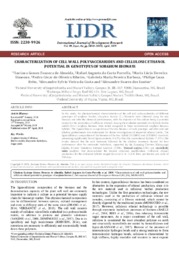Characterization of cell wall polysaccharides and cellulosic ethanol potential in genotypes of sorghum biomass.
Characterization of cell wall polysaccharides and cellulosic ethanol potential in genotypes of sorghum biomass.
Autoria: ALMEIDA, L. G. F. de; PARRELLA, R. A. da C.; SIMEONE, M. L. F.; RIBEIRO, P. C. de O.; BARBOSA, G. M. P.; BRITO, P. L.; COSTA, A. S. V. da; SANTOS, A. S. dos
Resumo: In this study, the physicochemical characterization of the cell wall polysaccharides of different genotypes of sorghum bicolor, (Sorghum bicolor (L.) Moench) were obtained using the raw biomass and after the chemical pretreatments, with the objective of this culture being a potential source for the production of cellulosic ethanol. Among the evaluated materials two hybrids brown midrib (bmr) sorghum biomass were tested compared to three conventional sorghum biomass hybrids. The lignocellulosic composition of the raw biomass of each genotype, and after acid and alkaline pretreatments was determined for future investigations of improved ethanol yields. The lignocellulosic composition of the biomass of the bmr hybrid 2015B002 and 2015B003 stood out, presenting significantly lower lignin contents (4.63%) than the conventional hybrids (7.15%).The results showed that the acid treatment followed by the alkaline treatment showed the best performance after the enzymatic hydrolysis, supported by the Scanning Electron Microscopy (SEM), Fourier Transform Infrared Analysis (FTIR), Thermal analysis (TG) and crystallinity index analyzes that demonstrated the desired structural modification. Cellulosic ethanol production for the evaluated hybrids ranged from 6,612 to 11,838 liters per hectare per cycle of 180 days.
Ano de publicação: 2019
Tipo de publicação: Artigo de periódico
Unidade: Embrapa Milho e Sorgo
Palavras-chave: Celulose, Hidrólise enzimática, Nervura, Rendimento de açúcar, Sorghum Bicolor
Observações
1 - Por padrão são exibidas publicações dos últimos 20 anos. Para encontrar publicações mais antigas, configure o filtro ano de publicação, colocando o ano a partir do qual você deseja encontrar publicações. O filtro está na coluna da esquerda na busca acima.
2 - Para ler algumas publicações da Embrapa (apenas as que estão em formato ePub), é necessário ter, no celular ou computador, um desses softwares gratuitos. Sistemas Android: Google Play Livros; IOS: iBooks; Windows e Linux: software Calibre.
Acesse outras publicações
Acesse a Base de Dados da Pesquisa Agropecuária (BDPA) para consultar o acervo completo das bibliotecas da Embrapa.

